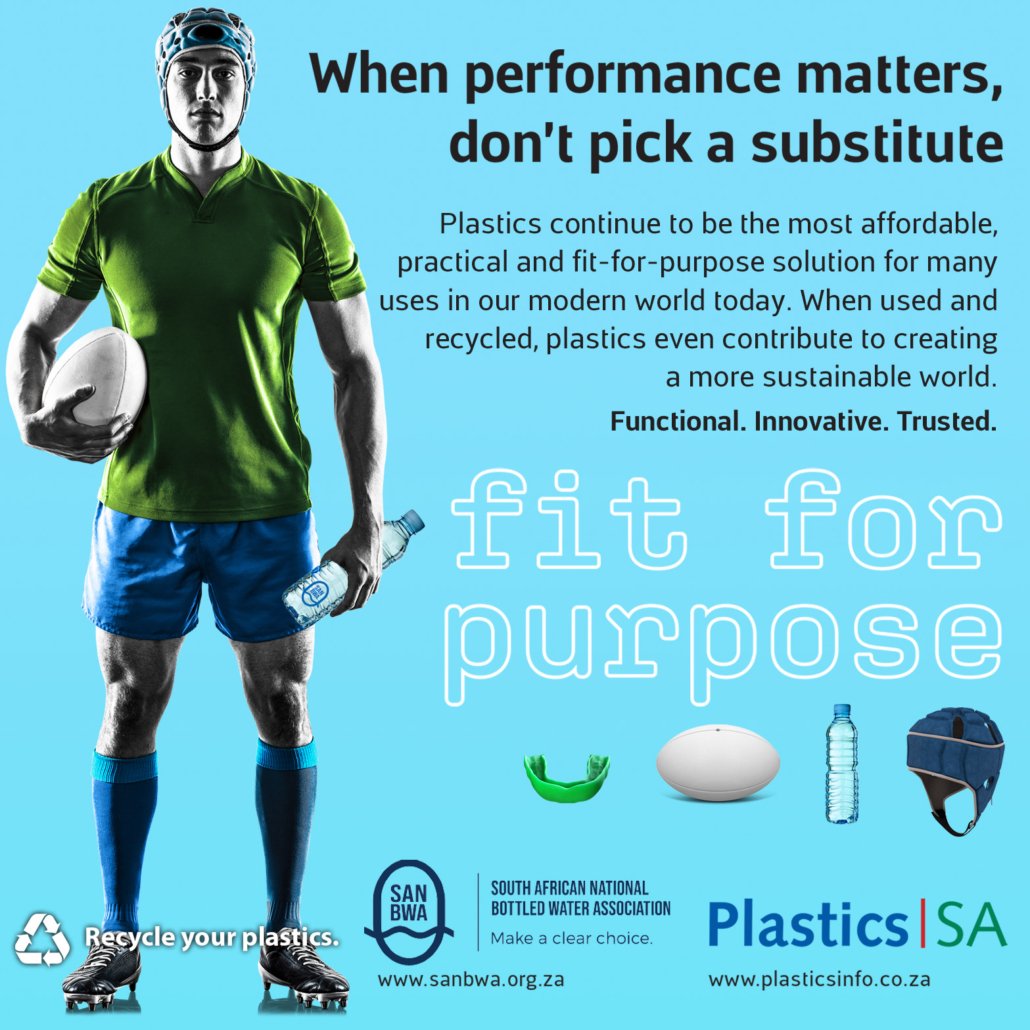When Performance matters, don’t pick a substitute.
South Africans are gearing up for another exciting rugby season. The World Rugby Sevens Series 2023 promises to be the most competitive and compelling to date with more at stake than ever before as the top four ranked men’s and women’s teams will earn Olympic qualification for Paris 2024.
Conscious of the impact such large spectator events have on the environment, Plastics SA and the South African National Bottled Water Association (SANBWA) have once again teamed up to raise awareness of the importance of using and discarding plastics responsibly.
We have been educating consumers about the importance and versatility of plastics in our everyday life and the invaluable role it plays in modern society with our Fit for Purpose campaign. Whether used to save lives in hospitals or extending the shelf life of food by preventing breakage and spoilage, plastics are functional, innovative and trusted to provide the most affordable, practical and suitable solutions for many uses in our modern world today.
Sport is no exception, plastics are relied upon to make the game possible (e.g. sports clothes and equipment, togs, balls, landing mats), but are also vital to keep players safe (e.g. mouth guards, scrum helmets and safety equipment).
We are living in an era where people are calling for alternatives to their plastic packaging without fully understanding the true impact these substitutes will have on the environment and their pockets. Ample research has proven that replacing plastic in consumer products and packaging with alternatives (that perform the same function) could increase the environmental costs as much as fourfold. It’s therefore important we keep a level head and don’t demand a change which might create more and bigger problems than the ones we are trying to solve. Buying food and beverages in plastic packaging that have been designed for recyclability – and then recycling those – is currently the best option for South Africa.
One such a study published by Trucost points out that over 342-million tonnes of alternative material would be needed to replace the 84-million tonnes of plastic used globally in consumer products and packaging. This has major implications for costs and environmental impacts associated with manufacturing (such as raw material, energy and water use) as well as distribution.
Charlotte Metcalf, CEO of SANBWA had this to say: ‘We need to make informed decisions based on sound, scientific research instead of kneejerk reactions and emotional arguments. For example, when we analyse its entire lifecycle, a water bottle (made from 50% recycled plastic) generates at least three times less carbon emissions than packaging made from alternative materials. In South Africa, we have high PET recycling rates thanks to the availability of technology that makes closed loop recycling (i.e. bottle-to-bottle recycling) possible and supports the circular economy for PET packaging.’
“We are excited about the growing collaboration between industries and role-players to clean-up the environment, encourage recycling and support collection efforts. As with any team sport, it is the way the individual players work together and support each other that ultimately determines its success. Plastics SA is grateful to work with SANBWA and other industry leaders as we step our efforts to reach greater audiences and effect lasting change,” says Anton Hanekom, Executive Director, Plastics SA.



